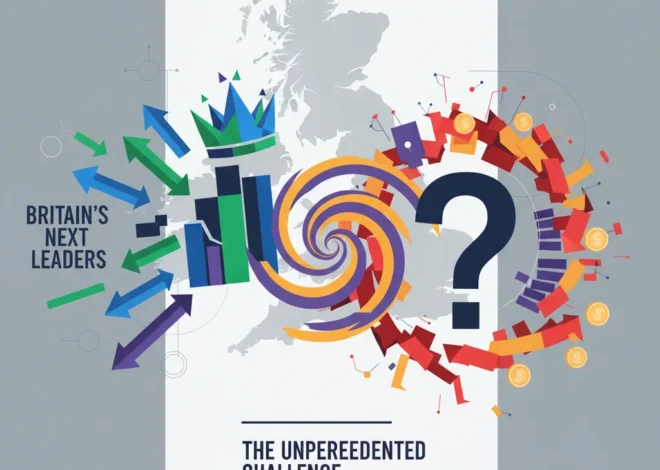
A New Pour: Can a Governance Guru Reignite Growth at Spirits Giant Diageo?
In the world of global finance and investing, the boardrooms of behemoth corporations are closely watched theaters of strategy and power. When a company like Diageo—the undisputed king of spirits and the maker of iconic brands like Guinness, Johnnie Walker, and Smirnoff—announces a change at the very top, the stock market holds its breath. The recent appointment of Sir John Manzoni, a seasoned executive with a formidable resume, as the new chairman is more than a routine succession; it’s a calculated move to navigate a period of unprecedented turbulence and stem a worrying decline in sales.
For investors, business leaders, and anyone with a stake in the global economy, this transition is a critical case study in corporate stewardship. Diageo isn’t just a company; it’s a bellwether for consumer sentiment, a titan of the FTSE 100, and a master of global brand-building. But even titans can stumble. After a period of robust growth, the company recently shocked the market by forecasting a significant slowdown, primarily driven by a sharp downturn in its Latin American and Caribbean markets, which account for over 10% of its total sales (source). The news sent its stock tumbling, wiping billions off its market capitalization and raising urgent questions about its strategy. Now, the board is betting that Sir John Manzoni is the steady hand needed to right the ship. But is he the right choice, and what does his appointment signal for the future of this beverage empire?
The Hangover: Diagnosing Diageo’s Current Challenges
To understand the significance of Manzoni’s appointment, we must first appreciate the depth of the challenges Diageo faces. The post-pandemic boom, which saw consumers indulge in premium spirits at home, has given way to a harsher economic reality. Several converging factors are putting pressure on the company’s bottom line:
- Macroeconomic Headwinds: Soaring inflation and rising interest rates across the globe have squeezed household budgets. This has a direct impact on discretionary spending, and while alcohol is often considered resilient, consumers may trade down from premium brands like Johnnie Walker Blue Label to more affordable alternatives. This is a core issue of economics affecting consumer behavior.
- Inventory Overload: A significant part of the problem, particularly in Latin America, was a buildup of excess inventory. As economic conditions worsened, distributors and retailers were left with more stock than they could sell, forcing a dramatic halt in new orders from Diageo.
- Shifting Consumer Tastes: The modern consumer is fickle. The “no and low” alcohol trend continues to gain momentum, while new categories like tequila and mezcal (where Diageo has a strong presence with brands like Casamigos and Don Julio) are seeing intense competition. The company must constantly innovate to stay relevant.
- Geopolitical and Supply Chain Risks: As a global operator, Diageo is exposed to a complex web of geopolitical tensions, trade tariffs, and supply chain disruptions. Efficiently managing this global network is a monumental task that directly impacts profitability. Modern financial technology and fintech solutions are becoming increasingly vital for managing such complex international supply chains.
This confluence of issues has put a spotlight on the company’s leadership and strategic direction. The question for the board was not just about finding a successor to the highly respected outgoing chairman, Javier Ferrán, but about finding a leader whose skills are precisely matched to the current storm. The Great Convergence: When Minimum Wage, Trade Wars, and AI Risks Collide
Who is Sir John Manzoni? A Profile in Complexity
Calling Sir John Manzoni simply a “former Tesco boss” is a significant understatement. While he served as a non-executive director at Tesco from 2013 to 2015, his career is far more extensive and provides crucial clues to his likely approach at Diageo. His journey has been defined by navigating and transforming some of the world’s most complex organizations.
His career can be broken down into three key phases:
- Big Oil (BP): Manzoni spent nearly 25 years at BP, rising to the role of Chief Executive of Refining & Marketing. This experience honed his skills in managing vast, capital-intensive global operations, dealing with commodity price volatility, and leading in a high-stakes, high-risk environment.
- UK Civil Service: In a remarkable career shift, he became the first-ever Chief Executive of the UK Civil Service, a role he held for over five years. He was tasked with modernizing government operations, improving efficiency, and driving transformation across a notoriously complex bureaucracy. According to a profile by the Institute for Government, his focus was on improving commercial skills and project management within government—skills directly transferable to a corporate giant.
- Board-Level Governance: His portfolio of non-executive directorships, including roles at SSE plc and KBR, Inc., demonstrates deep experience in corporate governance, energy transition, and strategic oversight.
This resume suggests a leader who is methodical, operationally focused, and an expert in managing complexity. He is not a spirits marketer, but a grand strategist of systems and structures. This is a critical distinction for anyone involved in investing or trading Diageo’s stock; the market may be looking for a sales messiah, but the board has hired a master architect.
The Rent Revolution: How Your Monthly Payment is About to Redefine Your Financial Future
Applying the Playbook: What Can Diageo Learn?
While not a direct parallel, Manzoni’s experience offers a playbook that could be instrumental for Diageo. The challenges of turning around a massive, multi-billion-pound organization—whether it’s a government department or a global corporation—share common themes. Here’s a look at the potential strategic pillars under his chairmanship, presented with a comparison of his past experience.
| Strategic Pillar | Experience from Manzoni’s Past | Potential Application at Diageo |
|---|---|---|
| Operational Excellence & Efficiency | Driving reforms in the UK Civil Service to reduce waste and improve project delivery. Managing complex refining and logistics at BP. | A deep dive into Diageo’s global supply chain to identify inefficiencies, optimize inventory management using better data analytics, and improve forecasting to prevent future gluts. |
| Disciplined Capital Allocation | Overseeing massive capital projects in the energy sector and managing strict public sector budgets. | Ensuring that investments in new brands, marketing, and technology deliver a clear and measurable return. A potential review of the brand portfolio to focus on the highest-growth opportunities. |
| Risk Management & Governance | Navigating the high-risk environment of the oil industry and implementing robust governance frameworks in government. | Strengthening oversight of regional operations to better anticipate and mitigate risks like the one seen in Latin America. Enhancing transparency and accountability across the business. |
| Digital Transformation | Championing the UK Government’s digital transformation agenda to improve services and data use. | Accelerating the use of financial technology and data science to understand consumer trends, personalize marketing, and create a more responsive business model. This could even involve exploring blockchain for authenticating super-premium products. |
The Investor’s Bottom Line: Stock Market Implications
For those engaged in the finance world, the key question is what this means for Diageo’s stock (LSE: DGE, NYSE: DEO). The initial stock market reaction to the sales warning was brutal, reflecting a crisis of confidence. Manzoni’s appointment is intended to be a stabilizing force.
In the short term, his arrival is unlikely to produce a dramatic sales turnaround. His influence as non-executive Chairman is strategic and long-term. However, investors will be looking for early signs of his impact:
- Clear Communication: A clear and credible plan to address the inventory issues and a realistic outlook for future growth.
- Focus on Margins: Initiatives aimed at cost control and operational efficiency could protect or even improve profit margins, even if top-line growth is slow. This is a key metric for the stock market.
- Strategic Clarity: A reaffirmation of the company’s commitment to “premiumization” but with a more disciplined approach to execution and market-by-market strategy.
Diageo remains a fundamentally strong company with an unparalleled portfolio of “moat” brands and significant pricing power. For long-term investors, the current dip could be seen as a buying opportunity, provided they believe in the new leadership’s ability to navigate the present challenges. The company’s dividend, a key attraction for many, appears safe for now, but its future growth will depend on a successful strategic reset. According to the initial announcement, the hope is squarely on the new chairman to help reignite growth. The banking and investment community will be watching his every move.
The Canary in the Coal Mine: What One Food Bank's Defiance Signals to the Global Economy
Conclusion: A Steady Hand for a Potent Mix
Diageo’s appointment of Sir John Manzoni is a powerful statement. It’s an acknowledgement that the company’s current challenges are not merely a marketing problem but a complex, operational, and strategic one. The board has chosen a leader renowned not for selling products, but for fixing and optimizing the vast machines that do.
The path forward will not be easy. The global economy remains uncertain, and consumer habits are in flux. Manzoni, alongside CEO Debra Crew, must create a more agile, resilient, and data-driven Diageo capable of thriving in this new environment. For the finance community, the story of Diageo’s next chapter will be a masterclass in corporate governance, strategic pivots, and the enduring power of iconic brands. The world will be watching to see if this new chairman can mix the perfect cocktail of stability and renewed growth.


